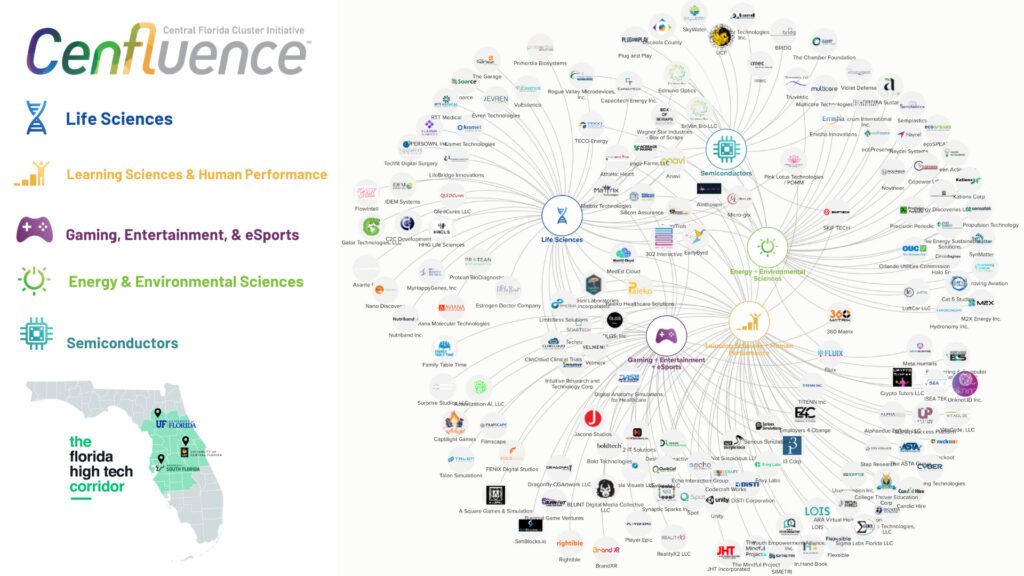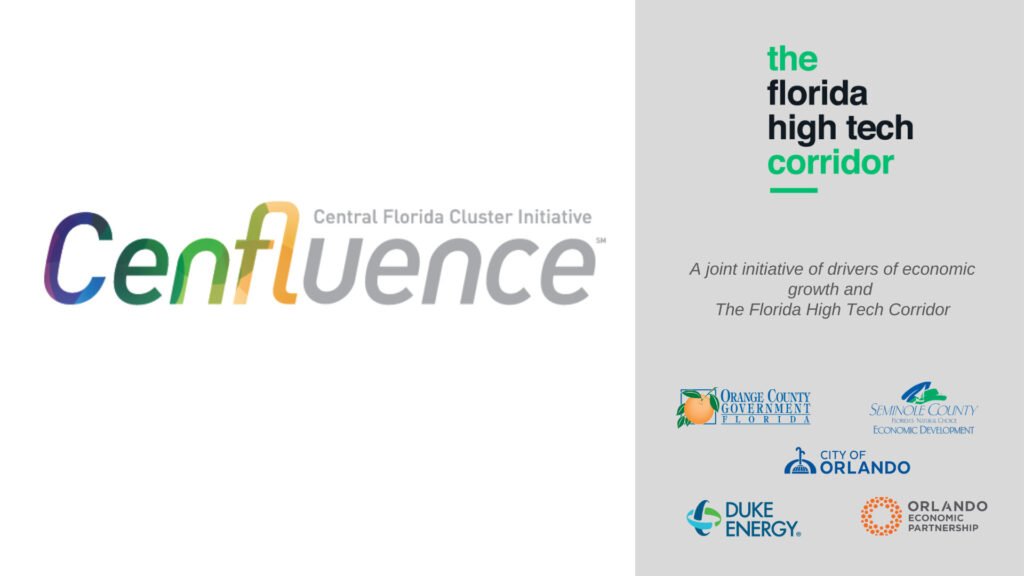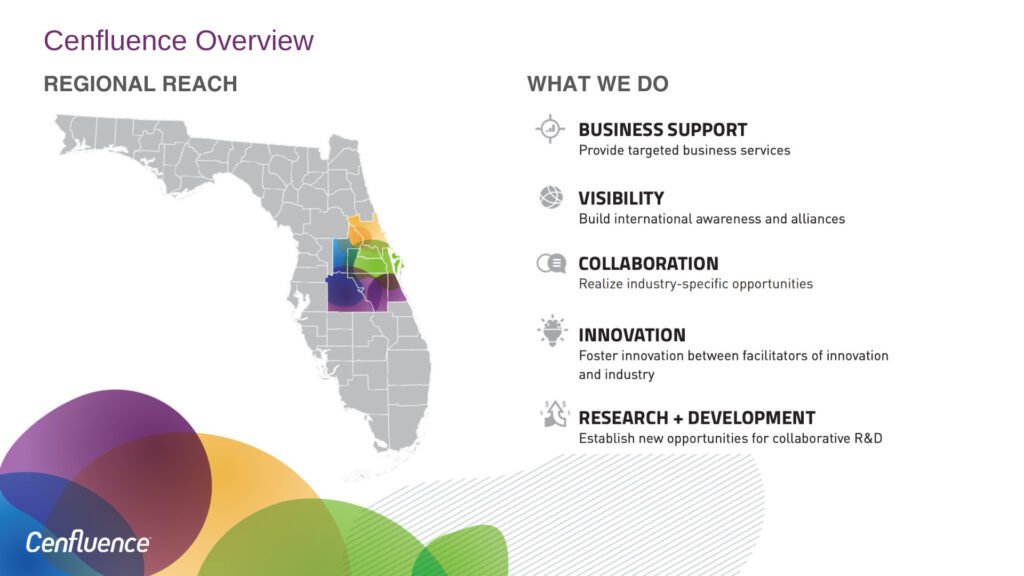What is the approximate stakeholder breakdown of your ecosystem?
Our Cluster Initiative – Cenfluence has a unique stakeholder breakdown, supported by a combination of public, private, and research institutions. Cenfluence, is under the Florida High Tech Corridor and benefits from funding and backing from university systems such as the University of Central Florida and the University of South Florida, as well as local governments including Orange County, the City of Orlando, and Seminole County. Additionally, organizations like The Orlando Economic Partnership and Duke Energy are key partners. In total, there are more than 150 relevant stakeholders within our ecosystem that are utilized by our over 230 cluster members.
Cenfluence’s ecosystem also supports a robust workforce, with its cluster members generating over 15,000 full-time jobs and more than 2,700 part-time jobs. Notably, 40% of these businesses are women- or minority-owned, demonstrating Cenfluence’s commitment to fostering diversity and inclusion. Since its inception, Cenfluence has helped identify over $48.1 million in tailored business opportunities and secured $26.2 million in funding for its members. By leveraging partnerships with over 150 entrepreneurial support organizations across Central Florida, Cenfluence connects its members with resources for research and development, funding opportunities, and pathways to international markets. This ecosystem is designed to fuel business growth for high-tech companies, driving innovation and increasing global competitiveness.

Who are the top 3 champions from your Ecosystem?
- The Florida High Tech Corridor – The Florida High Tech Corridor is pivotal to the success of Cenfluence, covering a 23-county region and anchored by three of the country’s largest research institutions: the University of Central Florida (UCF), the University of South Florida (USF), and the University of Florida (UF). Their mission is to catalyze high-tech innovation and academic excellence, creating a global ripple effect that advances the lives of people in the communities they serve. Their commitment to collaboration is evident in the investment they have made in advancing innovation. The Florida High Tech Corridor has invested $3.4 million in 44 research collaborations with 33 industry partners, supporting 13 SBIR/STTR projects with matching funds. They have also provided vital support to 187 student researchers, helping develop the next generation of talent in the region. Notably, 17% of these funds have been directed toward life sciences research, underlining their significant contribution to advancing this critical sector. Through their strategic alignment of academic, industry, and economic development opportunities, they are successfully unlocking the region’s potential and strengthening its position as a hub for innovation.
- University of South Florida (USF), University of Central Florida (UCF), University of Florida (UF) – These three universities play a pivotal role by providing research and development support, funding opportunities, and academic resources that fuel high-tech business growth and innovation.
- Local Governments – Key local government partners, including Orange County, the City of Orlando, and Seminole County, are instrumental in providing financial support and fostering a pro-business environment that facilitates connections to international markets and enhances the region’s entrepreneurial ecosystem.

What EU funding/collaboration are you involved with, or you would like to be part of?
Our Cluster Organization and our Cluster Members are interested in collaborating with like organizations under the Horizon Europe – Health Work Program.
Our Cluster Members have provided letters of support on Horizon Europe proposals under the Work Program Health. There are opportunities for our Cluster Members specialized in fields related to the six ‘destinations’ of the Work Program to participate as full partners as specified by the Program: “In recognition of the opening of the US National Institutes of Health’s programmes to European researchers, any legal entity established in the United States of America is eligible to receive Union funding.”
What are the key priorities and themes for your ecosystem?
The themes for the Cenfluence ecosystem revolve around fostering innovation, leveraging partnerships, and enhancing regional strengths. Cenfluence focuses on creating internationally recognized industry clusters that are competitive on a global scale. This is achieved by supporting high-tech business growth, connecting members with research and development opportunities, and facilitating partnerships that integrate academia, government, and private industry. Cenfluence’s key priorities are the following:
- Entrepreneurial Support and Business Growth: By offering tailored resources and connecting members to funding opportunities, Cenfluence aids startups and established businesses in overcoming growth challenges
- Collaboration and Networking: The ecosystem emphasizes partnerships between cluster members, local and international entities, and academic institutions, enhancing visibility and cross-cluster collaboration.
- Research and Development (R&D): Close ties with major research institutions like the University of Central Florida and the University of South Florida provide cluster members with access to cutting-edge R&D.
- Economic Impact and Global Outreach: Cenfluence aims to boost Central Florida’s economy by promoting job creation, encouraging investment, and positioning the region as a hub for foreign market entry.
- Innovation and Technology Commercialization: The focus is on nurturing sectors such as life sciences, digital health, and other high-tech fields, driving solutions from concept to market.
This multi-faceted approach helps Cenfluence support over 230 members across diverse industry sectors.

What is your primary strength as an ecosystem?
Cenfluence’s primary strength lies in its collaborative ecosystem, known for playing well with various entities across Central Florida. Collaboration is key, as we bring together stakeholders from industry, academia, and government, spanning 23 counties.
This broad reach enables Cenfluence to assist European and local companies:
- European Companies – Cenfluence provides guidance on soft-landing opportunities as well as connections to relevant stakeholders that can assist the European company in establishing a presence or created partnerships to reach the US market and/or extensive research/product development community.
- Local Companies – Cenfluence connects Cluster Members with diverse business communities, each with varying strengths in business connectivity. Cenfluence also provides a range of services that complement what is available within the local ecosystem.

Which are the main hospitals in your ecosystem and which are the most active in your ecosystems?
The main hospitals in the Cenfluence ecosystem include AdventHealth, Orlando Health, Nemours Children’s Hospital, the Orlando VA Medical Center, HCA’s Central Florida Regional Hospital, Tampa General Hospital (TGH), Moffitt Cancer Center, and facilities within Lake Nona’s Medical City.
AdventHealth and Orlando Health are particularly active, with AdventHealth supporting cutting-edge research through initiatives like the Diabetes Institute and Orlando Health advancing healthcare through its UF Health Cancer Center. Additionally, Tampa General Hospital (TGH) and Moffitt Cancer Center are key players in the region, with TGH providing extensive trauma and transplant services, and Moffitt’s global leadership in cancer research and care.
A key development in this ecosystem is Lake Nona’s Medical City, which houses a concentrated cluster of medical institutions, research facilities, and cutting-edge healthcare companies. This includes UCF’s College of Medicine and the UCF Lake Nona Hospital, a joint venture with HCA Healthcare
This area, recognized as a global medical hub, not only strengthens Central Florida’s healthcare sector but also enhances its reputation as a center for medical innovation and research. The collaboration between hospitals, universities, and businesses within Lake Nona significantly contributes to the high-tech and life sciences ecosystem in the region.

